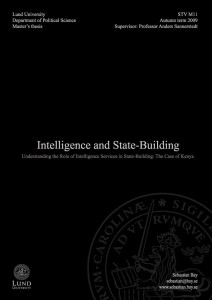Intelligence and State-Building
Understanding the Role of Intelligence Services in State-Building: The Case of Kenya
 The intelligence sector of any state plays a major role in safeguarding national security, and in the extreme, it acts to preserve the very survival of the state. Even though maintaining effective control and oversight over intelligence services is as important to the democracy “as maintaining control over the armed forces, intelligence services have received much less attention from scholars and those supporting the democratization process” (Caparini 2007, 3).
The intelligence sector of any state plays a major role in safeguarding national security, and in the extreme, it acts to preserve the very survival of the state. Even though maintaining effective control and oversight over intelligence services is as important to the democracy “as maintaining control over the armed forces, intelligence services have received much less attention from scholars and those supporting the democratization process” (Caparini 2007, 3).
The research available about intelligence services in developing countries is mediocre at best and research is virtually non-existent regarding intelligence and state-building. We know very little about the role of intelligence services in the making of states in general and postcolonial states in particular (cf. Goscha 2007, 100f; Chappuis and Hänggi 2009, 31).
Reforming intelligence services in emerging democracies is one of the most important and difficult activities facing any government. In order to achieve democratic consolidation, controlling intelligence services is vital for several reasons. First, as the organization in charge of internal security and regime protection, it is important that it operates within the rule of law without abusing its authority. Second, authority and civilian control are needed to ensure that the elected government holds genuine control over the monopoly on violence. If this is not achieved the intelligence services risks remaining or becoming a state within a state effectively preventing democratic consolidation (cf. Macdonald 2007, 301; Bruneau 2001, 337; Boraz 2009, 84).
Even though the role of intelligence services is essential for liberal, open, and democratic state-building to occur, we know little of the exact role of intelligence services in the state-building process. I believe that it is important to better
understand this process in order to be able to enhance support for the democratization process in emerging democracies, something that is even truer regarding African states, where academic research traditionally has had a difficult time understanding state-building (cf. Herbst 2000, 3f). If authoritarian regimes are to reform the tools and manuals must be available, precisely and simply explained by Wilson Boinett:
“I believe [former Kenyan President] Moi wanted to reform the Special Branch but he did not know how to proceed. It had never been done in a similar context before and there was no information available on what to do or how to proceed.” (Boinett 2010).
Aim and purpose
“Intelligence, if we understand it, might some day be more clearly a force for good. If intelligence is ever to be a force for good, then it must be studied. We can bet that, if we remain ignorant of it, intelligence will certainly be a force for ill.” (Warner 2009, 29f).
The purpose of this thesis is to contribute to the development of a theory about the role of intelligence services in state-building. To this end I have studied and analyzed the role of the Kenyan intelligence services in the Kenyan state-building endeavor. My ambition has been to use the Kenyan experience to better understand what role intelligence services play in state-building.
While such a case study might say little about how intelligence universally influences statebuilding, it does, I argue, work towards providing a framework for how such a relationship can work, thereby offering a theoretical approach to the subject. The goal is to inform, inspire and offer a set of theoretical spectacles that can be used to view other cases. To this end my research is using the Kenyan experience to develop a number of theoretical approached to the role of intelligence services in state-building.
Download the Master’s Thesis here: Intelligence and State-Building
June 4th, 2010